【语法强练专讲】2015届中考语法知识名师手册: 第11讲 句子种类和成分
文档属性
| 名称 | 【语法强练专讲】2015届中考语法知识名师手册: 第11讲 句子种类和成分 |
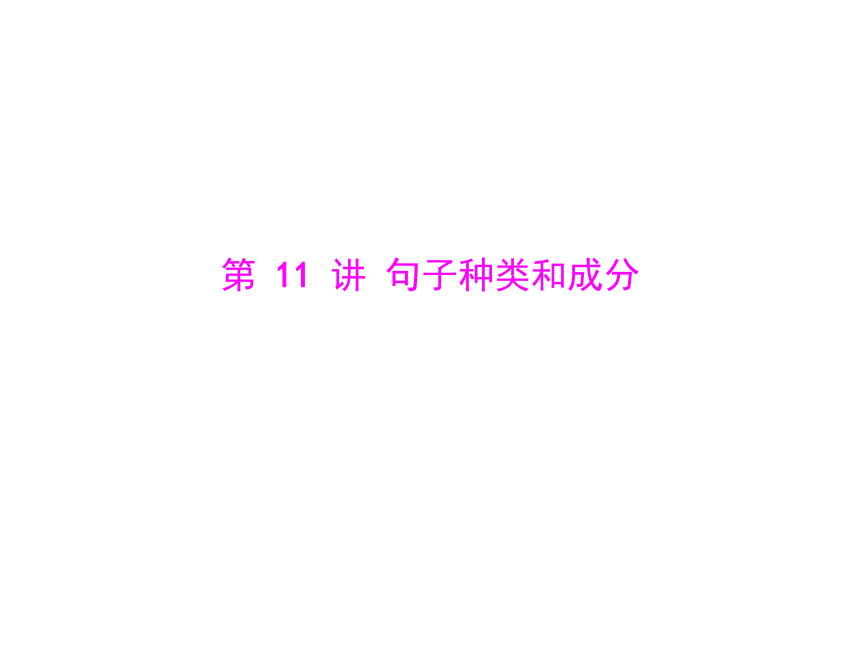
|
|
| 格式 | zip | ||
| 文件大小 | 74.3KB | ||
| 资源类型 | 教案 | ||
| 版本资源 | 外研版 | ||
| 科目 | 英语 | ||
| 更新时间 | 2014-08-04 16:17:53 | ||
图片预览

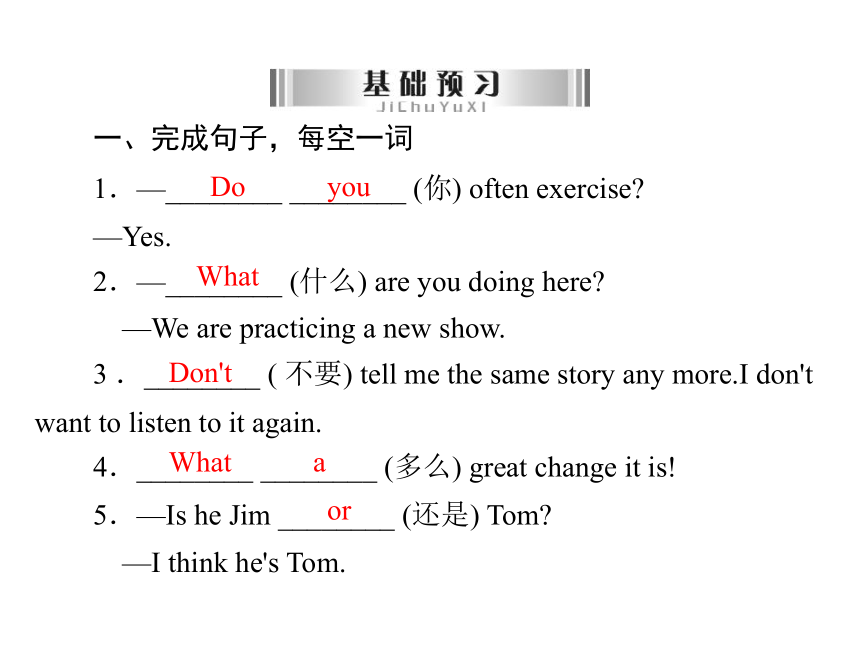
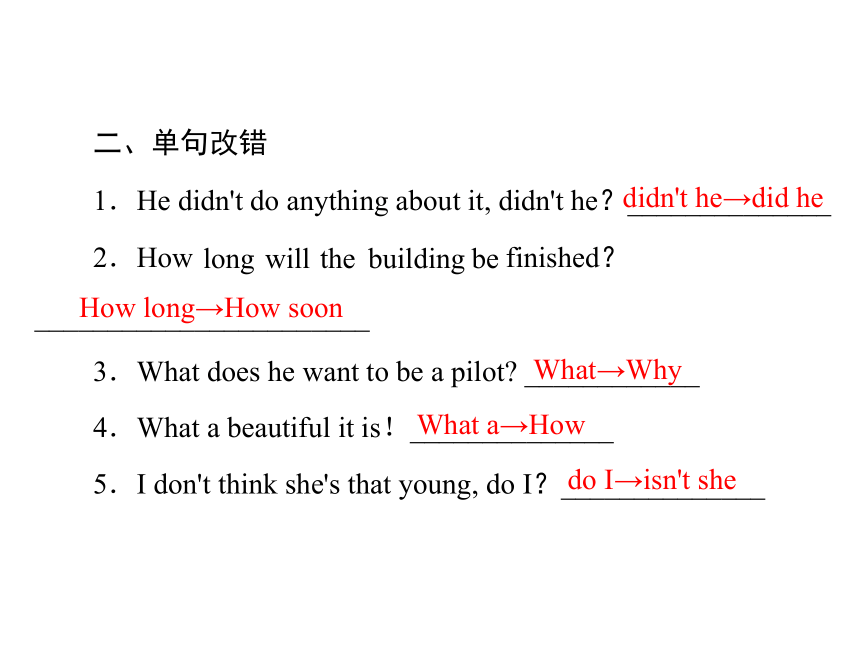
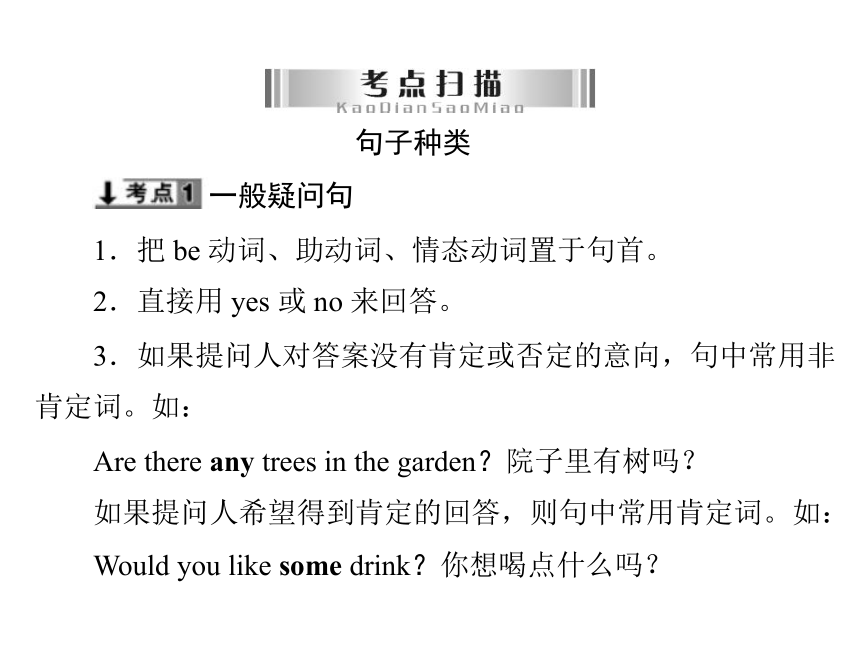
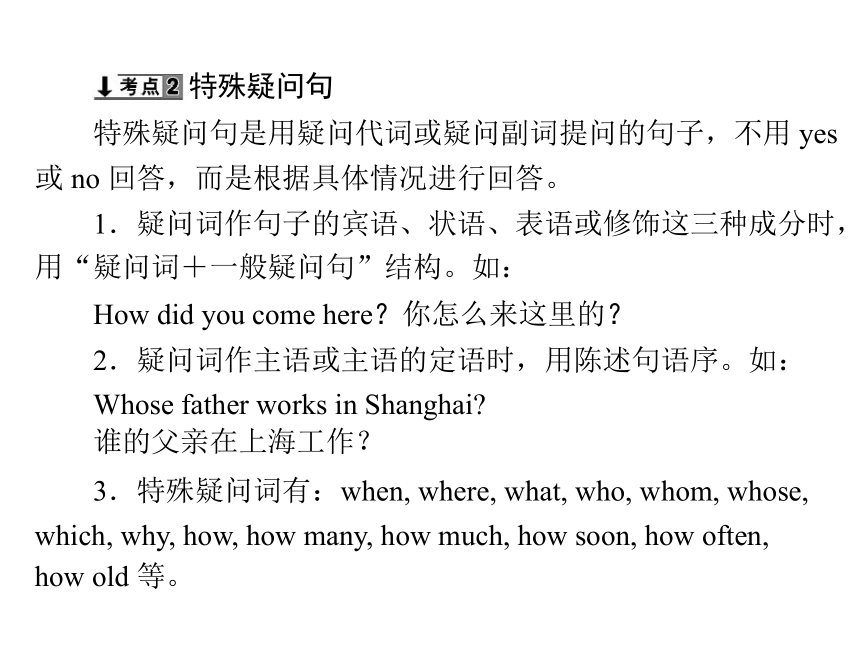
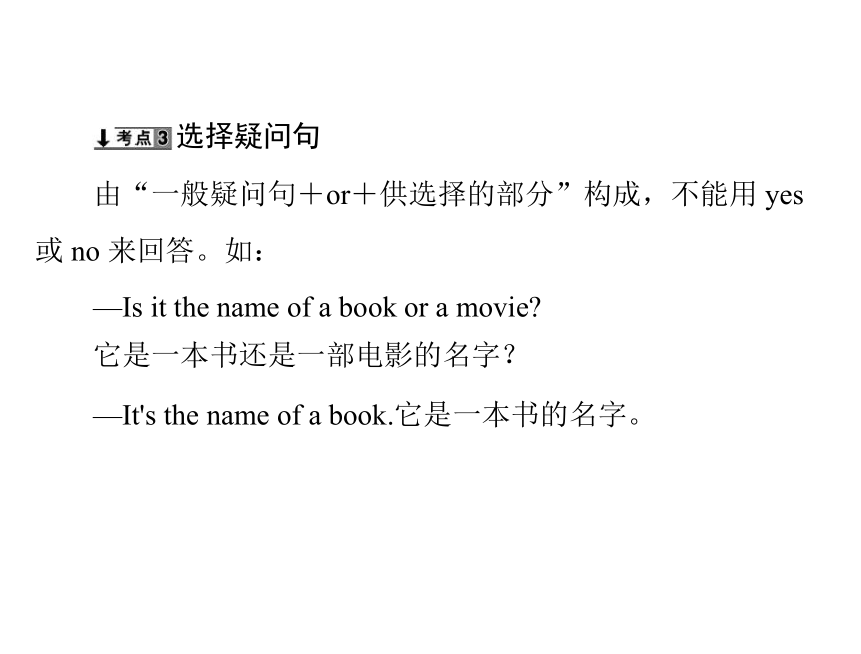
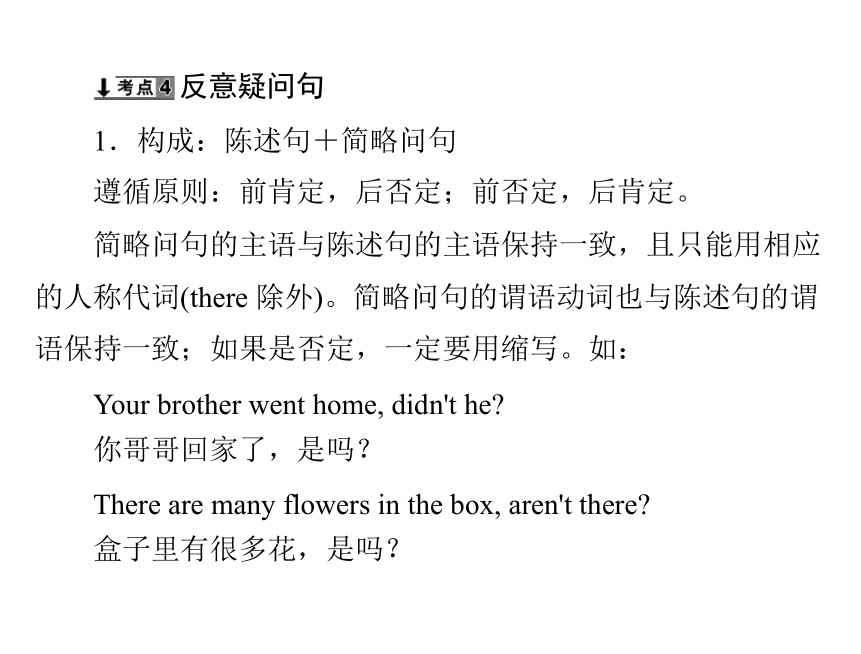
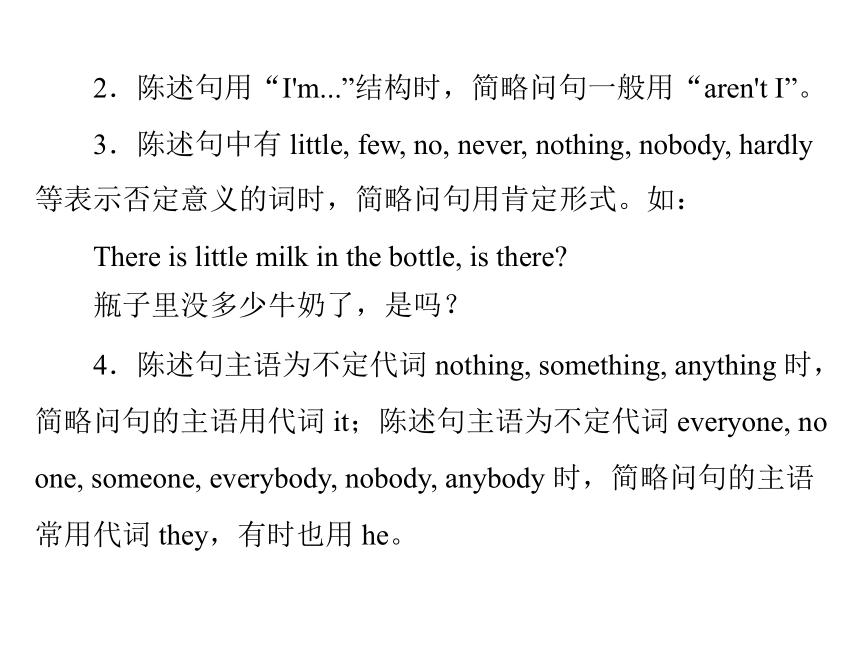
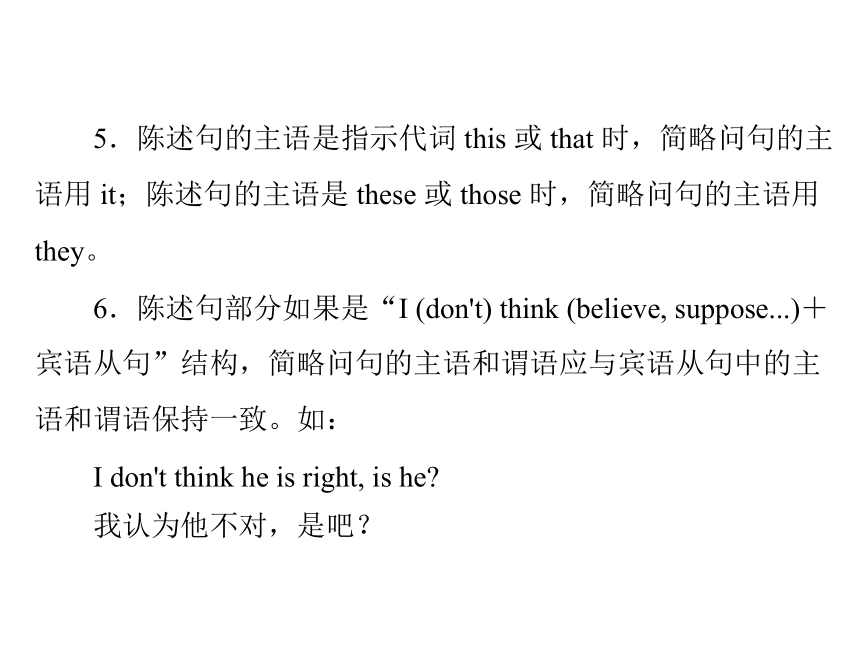
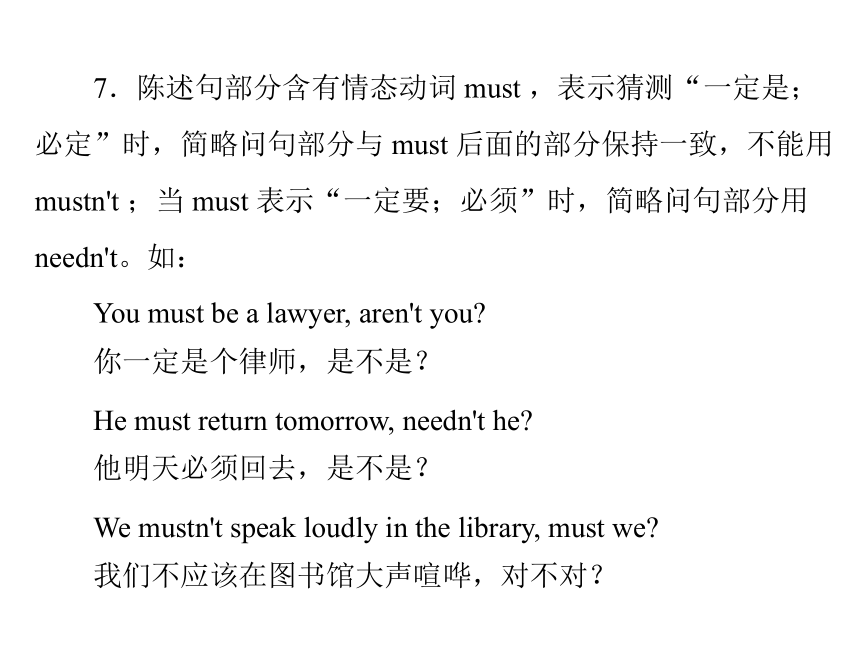
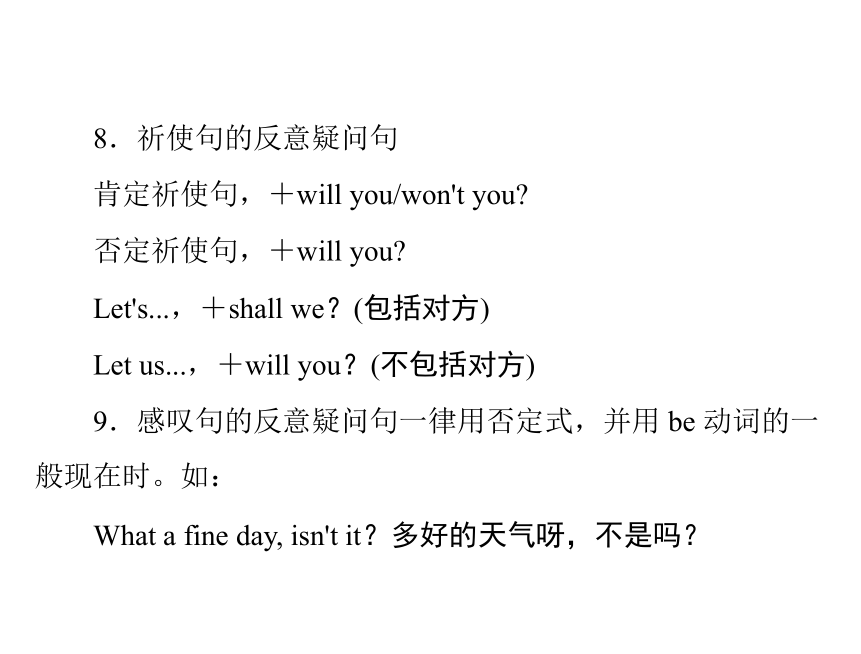
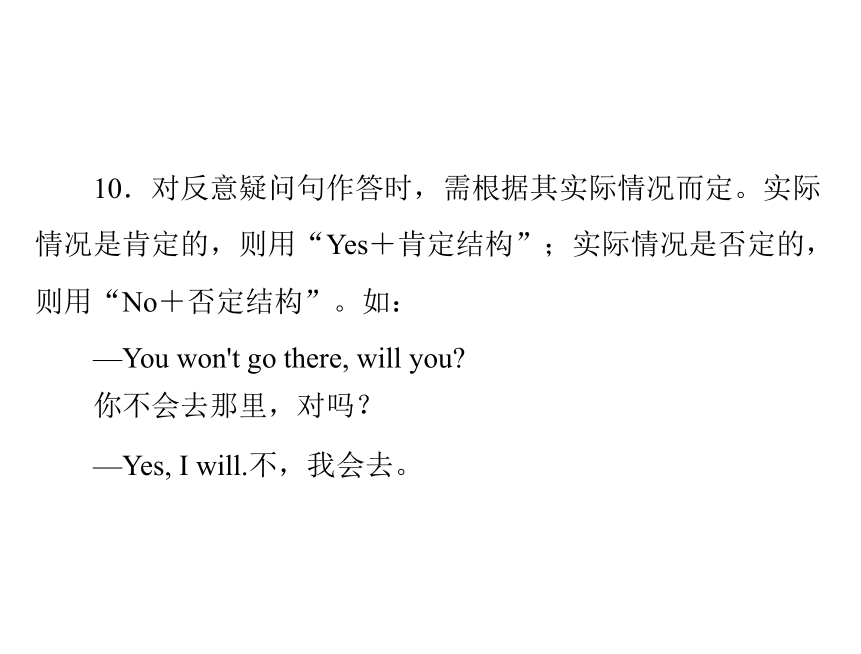
文档简介
课件35张PPT。第 11 讲句子种类和成分一、完成句子,每空一词DoyouWhat1.—________ ________ (你) often exercise?—Yes.Don'tWhata2.—________ (什么) are you doing here?
—We are practicing a new show.
3 .________ ( 不要) tell me the same story any more.I don'twant to listen to it again.or4.________ ________ (多么) great change it is!
5.—Is he Jim ________ (还是) Tom?
—I think he's Tom.didn't he→did heHow long→How soon二、单句改错
1.He didn't do anything about it, didn't he?______________2.Howlongwillthebuildingbefinished?_______________________What→Why3.What does he want to be a pilot? ____________
4.What a beautiful it is!______________
5.I don't think she's that young, do I?______________What a→Howdo I→isn't she句子种类一般疑问句1.把 be 动词、助动词、情态动词置于句首。
2.直接用 yes 或 no 来回答。3.如果提问人对答案没有肯定或否定的意向,句中常用非肯定词。如:Are there any trees in the garden?院子里有树吗?如果提问人希望得到肯定的回答,则句中常用肯定词。如:
Would you like some drink?你想喝点什么吗?特殊疑问句特殊疑问句是用疑问代词或疑问副词提问的句子,不用 yes或 no 回答,而是根据具体情况进行回答。1.疑问词作句子的宾语、状语、表语或修饰这三种成分时,用“疑问词+一般疑问句”结构。如:
How did you come here?你怎么来这里的?2.疑问词作主语或主语的定语时,用陈述句语序。如:Whose father works in Shanghai?
谁的父亲在上海工作?3.特殊疑问词有:when, where, what, who, whom, whose,which, why, how, how many, how much, how soon, how often,how old 等。选择疑问句由“一般疑问句+or+供选择的部分”构成,不能用 yes或 no 来回答。如:—Is it the name of a book or a movie?
它是一本书还是一部电影的名字?—It's the name of a book.它是一本书的名字。反意疑问句1.构成:陈述句+简略问句遵循原则:前肯定,后否定;前否定,后肯定。 简略问句的主语与陈述句的主语保持一致,且只能用相应
的人称代词(there 除外)。简略问句的谓语动词也与陈述句的谓
语保持一致;如果是否定,一定要用缩写。如:Your brother went home, didn't he?
你哥哥回家了,是吗?There are many flowers in the box, aren't there?
盒子里有很多花,是吗? 2.陈述句用“I'm...”结构时,简略问句一般用“aren't I”。
3.陈述句中有 little, few, no, never, nothing, nobody, hardly
等表示否定意义的词时,简略问句用肯定形式。如:There is little milk in the bottle, is there?
瓶子里没多少牛奶了,是吗? 4.陈述句主语为不定代词 nothing, something, anything 时,
简略问句的主语用代词 it;陈述句主语为不定代词 everyone, no
one, someone, everybody, nobody, anybody 时,简略问句的主语
常用代词 they,有时也用 he。 5.陈述句的主语是指示代词 this 或 that 时,简略问句的主
语用 it;陈述句的主语是 these 或 those 时,简略问句的主语用
they。 6.陈述句部分如果是“I (don't) think (believe, suppose...)+
宾语从句”结构,简略问句的主语和谓语应与宾语从句中的主
语和谓语保持一致。如:I don't think he is right, is he?
我认为他不对,是吧? 7.陈述句部分含有情态动词 must ,表示猜测“一定是;
必定”时,简略问句部分与 must 后面的部分保持一致,不能用
mustn't ;当 must 表示“一定要;必须”时,简略问句部分用
needn't。如:You must be a lawyer, aren't you?
你一定是个律师,是不是?He must return tomorrow, needn't he?
他明天必须回去,是不是?We mustn't speak loudly in the library, must we?
我们不应该在图书馆大声喧哗,对不对?8.祈使句的反意疑问句肯定祈使句,+will you/won't you?
否定祈使句,+will you?Let's...,+shall we?(包括对方)Let us...,+will you?(不包括对方)9.感叹句的反意疑问句一律用否定式,并用 be 动词的一般现在时。如:What a fine day, isn't it?多好的天气呀,不是吗? 10.对反意疑问句作答时,需根据其实际情况而定。实际
情况是肯定的,则用“Yes+肯定结构”;实际情况是否定的,
则用“No+否定结构”。如:—You won't go there, will you?
你不会去那里,对吗?—Yes, I will.不,我会去。祈使句 祈使句用以表示命令、请求、叮嘱或建议,主语通常省略。
肯定式谓语动词用原形,否定式用“Don't (Never) +动词原
形” 。如:Turn on the light.开灯。Don't turn on the light.不要开灯。感叹句感叹句通常用 what 或 how 引导,用来表示强烈的感情。感叹句的基本句型有:
1.以 how 开头的感叹句(1)How+形容词/副词+主语+谓语
How high the building is! 这楼真高!
(2)How+形容词/副词(省略主语和谓语)
How interesting (it is)!真有趣!(3)how 还可修饰动词,句型是“How+主语+谓语”。如:How they need a good teacher!他们是多么需要一位好老师呀!
2.以 what 开头的感叹句(1)What (+a/an)+形容词+名词(+主语+谓语)
What a beautiful flower it is!多美丽的一朵花啊!
What fine weather!多好的天气!(2)What (+a/an)+名词(省略主语和谓语)
What a pity!真遗憾!句子成分句子的成分包括:主语、谓语、宾语、表语、定语、状语、同位语和宾语补足语。见下表:续表()1.(2013 年广东)—You haven't been to the West Lake,have you?
—________.But I will go there with my parents this summer
vacation.A.No, I haven't
C.Yes, I haveB.No, I didn't
D.yes, I did A 题意:“你从来没有去过西湖,是吗?”“是的,我
没有去过。但是这个暑假我将和父母一起去。”反意疑问句要
根据实际情况来回答,根据题意可知是表示“没有去过”,故
选 A。()2.(2013 年广东佛山)________ delicious food mymother cooks every day!
A.What a
B.What
C.HowBwhat 引导的感叹句句式为“what (+a/an) +形容词+名词+主语+谓语”,how 引导的感叹句句式为“how+形容
词+主语+谓语”,若形容词后是一个完整的句子,则应用 how
引导,由此可排除 C。又因 food 是不可数名词,故选 B。()3.(2014 年广东河源)________ interesting book it is!A.How
B.What
C.What an
D.How aCwhat 引导的感叹句句式为“What+a/an+形容词+名词+主语+谓语!”,interesting 以元音音素开头,应该用冠词
an,故选 C。()4.(2014 年广东深圳)—Rose, we will start at sixtomorrow morning.Don't be late, ________?
—________.I'll be there on time.
A.won't you; Yes, I will
B.will you; Yes, I will
C.will you; No, I won't
D.won't you; No, I won't
C 根据前否后肯的原则,可排除 A、D 两项;又根据回答
可知实际情况是“不会迟到”,故选 C。()5.(2013 年广东)—Alice had nothing for breakfast thismorning, ________?
—No.She got up too late.
A. had she
B.hadn't she
C.did she
D.didn't sheC前面陈述句中有表示否定的 nothing,动词 had 是实义动词,故简略问句要借助助动词 did,且用肯定形式,故选 C。()6.(2014 年广东广州)I hear the tall girl wearing glassesis your new classmate.She's from Ame-rica, ________?
A. has she
B.isn't she
C.hasn't she
D.does she
B 前面陈述句是肯定句,其 be 动词为 is,故简略问句中
用 isn't。()7.(2011 年广东深圳)—There is something wrong withyour bike, ________?
—Yes.I'll have it ________ tomorrow.
A. isn't it; mend
B.isn't there; mended
C.isn't it; mended
D.isn't there; mend
B there be 句型的反意疑问句主语仍用 there,且陈述句部
分是肯定的,故其简略问句用否定形式;自行车是“被修理”,
故用 have sth.done (使某事被做)。()8.(2013 年广东深圳)—________ good time we had atthe party last night!
—Yes.It was ________ exciting party that I would never
forget it. A. What; so
C.What a; such an B.How; such
D.How a; so anCwhat 引导的感叹句句式为“What (+a/an)+形容词+名词(+主语+谓语)!”,time 在此为可数名词,意为“时光”;
“such (+a/an)+形容词+名词+that 从句”意为“如此……以
至于……”,故选 C。()9.(2014 年广东佛山)________ cute the monkeys arewhen they ask for food!A. HowB.WhatC.What aAhow 引导的感叹句句式为“How+形容词+主语+谓语!”,故选 A。()10.(2013 年广东佛山)—________ is the history ofTsinghua University?
—100 years.A. How soonB.How longC.How farB由答语可知是提问时间长短的,故用 how long ,意为“多长时间”。()11.(2014 年广东肇庆)The students in Class Two playedbasketball against Class One yesterday, ________?A. did theyB.didn't theyC.weren't they B 陈述句部分是肯定句,且谓语动词为 played,故其反意
疑问句要借助助动词 did 且为否定形式。()12.(2013年广东河源)Let's go to the cinema to see afilm, ________? A. will you
C.won't youB.shall we
D.don't you前面是 Let's 开头的祈使句,其反意疑问句应用 shall B
we。()13.(2014年广东河源)—Peter, ________ do you visityour grandparents?
—Twice a month.
A. how long
B.how soon
C.how far
D.how often
D 由答语可知是对频率提问,故用 how often,表示“多
久一次”。( )14.(2013 年广东河源)—________ delicious beef!
—Well.You can eat more if you like it. A. What
C.How B.What a
D.How aAwhat 引导的感叹句句式为“What (+a/an)+形容词+名词(+主语+谓语)!”,beef 是不可数名词,故选 A。()15.(2014 年广东茂名)Don't open the door, ________?A.aren't youB.don't youC.will you C 祈使句的反意疑问句用“will/won't you”,因陈述句部分
是否定的,故用 will you。( )16.(2013 年广东)The boy has a new MP4, ________?
A. doesn't he
B.isn't he
C.does he
D.is heAhave 表示“拥有”时,其反意疑问句有两种形式:“hasn't/haven't/hadn't+主语”或“doesn't/don't/didn't+主语”。
故选 A。()17.(2014 年广东)—________ will you come back? —In an hour.
A. How soon
B.How often
C.How far
D.How long
A 由答语“一小时后”可知是提问“多久以后”,故用
how soon。()18.(2013 年广东深圳)—Let's go to the zoo by taxi,________?
—Maybe we can go there ________.It's not far.
A. won't you; on foot
B.won't you; by foot
C.shall we; by foot
D.shall we; on footDLet's 开头的祈使句,其反意疑问句用 shall we ;表示“步行”用 on foot。()19.(2014 年广东佛山)________ sad we felt at the newsof the Yushu earthquake!A. WhatB.What aC.HowChow 引导的感叹句句式为“How +形容词+主语+谓语!”,故选 C。()20.(2013 年广东茂名)—Do you know ________Mr.Smith comes to the shop?
—Once a week.A. how oftenB.how longC.how soonA 根据答语“Once a week.”可知是提问频率,故选 A。()21.(2014年广东湛江)—There is some beef in thefridge, ________?
—Yes, there is.
A. is there
B.isn't there
C.has there
D.hasn't there
B 陈述句部分为 there be 句型,故简略问句用 isn't there。
—We are practicing a new show.
3 .________ ( 不要) tell me the same story any more.I don'twant to listen to it again.or4.________ ________ (多么) great change it is!
5.—Is he Jim ________ (还是) Tom?
—I think he's Tom.didn't he→did heHow long→How soon二、单句改错
1.He didn't do anything about it, didn't he?______________2.Howlongwillthebuildingbefinished?_______________________What→Why3.What does he want to be a pilot? ____________
4.What a beautiful it is!______________
5.I don't think she's that young, do I?______________What a→Howdo I→isn't she句子种类一般疑问句1.把 be 动词、助动词、情态动词置于句首。
2.直接用 yes 或 no 来回答。3.如果提问人对答案没有肯定或否定的意向,句中常用非肯定词。如:Are there any trees in the garden?院子里有树吗?如果提问人希望得到肯定的回答,则句中常用肯定词。如:
Would you like some drink?你想喝点什么吗?特殊疑问句特殊疑问句是用疑问代词或疑问副词提问的句子,不用 yes或 no 回答,而是根据具体情况进行回答。1.疑问词作句子的宾语、状语、表语或修饰这三种成分时,用“疑问词+一般疑问句”结构。如:
How did you come here?你怎么来这里的?2.疑问词作主语或主语的定语时,用陈述句语序。如:Whose father works in Shanghai?
谁的父亲在上海工作?3.特殊疑问词有:when, where, what, who, whom, whose,which, why, how, how many, how much, how soon, how often,how old 等。选择疑问句由“一般疑问句+or+供选择的部分”构成,不能用 yes或 no 来回答。如:—Is it the name of a book or a movie?
它是一本书还是一部电影的名字?—It's the name of a book.它是一本书的名字。反意疑问句1.构成:陈述句+简略问句遵循原则:前肯定,后否定;前否定,后肯定。 简略问句的主语与陈述句的主语保持一致,且只能用相应
的人称代词(there 除外)。简略问句的谓语动词也与陈述句的谓
语保持一致;如果是否定,一定要用缩写。如:Your brother went home, didn't he?
你哥哥回家了,是吗?There are many flowers in the box, aren't there?
盒子里有很多花,是吗? 2.陈述句用“I'm...”结构时,简略问句一般用“aren't I”。
3.陈述句中有 little, few, no, never, nothing, nobody, hardly
等表示否定意义的词时,简略问句用肯定形式。如:There is little milk in the bottle, is there?
瓶子里没多少牛奶了,是吗? 4.陈述句主语为不定代词 nothing, something, anything 时,
简略问句的主语用代词 it;陈述句主语为不定代词 everyone, no
one, someone, everybody, nobody, anybody 时,简略问句的主语
常用代词 they,有时也用 he。 5.陈述句的主语是指示代词 this 或 that 时,简略问句的主
语用 it;陈述句的主语是 these 或 those 时,简略问句的主语用
they。 6.陈述句部分如果是“I (don't) think (believe, suppose...)+
宾语从句”结构,简略问句的主语和谓语应与宾语从句中的主
语和谓语保持一致。如:I don't think he is right, is he?
我认为他不对,是吧? 7.陈述句部分含有情态动词 must ,表示猜测“一定是;
必定”时,简略问句部分与 must 后面的部分保持一致,不能用
mustn't ;当 must 表示“一定要;必须”时,简略问句部分用
needn't。如:You must be a lawyer, aren't you?
你一定是个律师,是不是?He must return tomorrow, needn't he?
他明天必须回去,是不是?We mustn't speak loudly in the library, must we?
我们不应该在图书馆大声喧哗,对不对?8.祈使句的反意疑问句肯定祈使句,+will you/won't you?
否定祈使句,+will you?Let's...,+shall we?(包括对方)Let us...,+will you?(不包括对方)9.感叹句的反意疑问句一律用否定式,并用 be 动词的一般现在时。如:What a fine day, isn't it?多好的天气呀,不是吗? 10.对反意疑问句作答时,需根据其实际情况而定。实际
情况是肯定的,则用“Yes+肯定结构”;实际情况是否定的,
则用“No+否定结构”。如:—You won't go there, will you?
你不会去那里,对吗?—Yes, I will.不,我会去。祈使句 祈使句用以表示命令、请求、叮嘱或建议,主语通常省略。
肯定式谓语动词用原形,否定式用“Don't (Never) +动词原
形” 。如:Turn on the light.开灯。Don't turn on the light.不要开灯。感叹句感叹句通常用 what 或 how 引导,用来表示强烈的感情。感叹句的基本句型有:
1.以 how 开头的感叹句(1)How+形容词/副词+主语+谓语
How high the building is! 这楼真高!
(2)How+形容词/副词(省略主语和谓语)
How interesting (it is)!真有趣!(3)how 还可修饰动词,句型是“How+主语+谓语”。如:How they need a good teacher!他们是多么需要一位好老师呀!
2.以 what 开头的感叹句(1)What (+a/an)+形容词+名词(+主语+谓语)
What a beautiful flower it is!多美丽的一朵花啊!
What fine weather!多好的天气!(2)What (+a/an)+名词(省略主语和谓语)
What a pity!真遗憾!句子成分句子的成分包括:主语、谓语、宾语、表语、定语、状语、同位语和宾语补足语。见下表:续表()1.(2013 年广东)—You haven't been to the West Lake,have you?
—________.But I will go there with my parents this summer
vacation.A.No, I haven't
C.Yes, I haveB.No, I didn't
D.yes, I did A 题意:“你从来没有去过西湖,是吗?”“是的,我
没有去过。但是这个暑假我将和父母一起去。”反意疑问句要
根据实际情况来回答,根据题意可知是表示“没有去过”,故
选 A。()2.(2013 年广东佛山)________ delicious food mymother cooks every day!
A.What a
B.What
C.HowBwhat 引导的感叹句句式为“what (+a/an) +形容词+名词+主语+谓语”,how 引导的感叹句句式为“how+形容
词+主语+谓语”,若形容词后是一个完整的句子,则应用 how
引导,由此可排除 C。又因 food 是不可数名词,故选 B。()3.(2014 年广东河源)________ interesting book it is!A.How
B.What
C.What an
D.How aCwhat 引导的感叹句句式为“What+a/an+形容词+名词+主语+谓语!”,interesting 以元音音素开头,应该用冠词
an,故选 C。()4.(2014 年广东深圳)—Rose, we will start at sixtomorrow morning.Don't be late, ________?
—________.I'll be there on time.
A.won't you; Yes, I will
B.will you; Yes, I will
C.will you; No, I won't
D.won't you; No, I won't
C 根据前否后肯的原则,可排除 A、D 两项;又根据回答
可知实际情况是“不会迟到”,故选 C。()5.(2013 年广东)—Alice had nothing for breakfast thismorning, ________?
—No.She got up too late.
A. had she
B.hadn't she
C.did she
D.didn't sheC前面陈述句中有表示否定的 nothing,动词 had 是实义动词,故简略问句要借助助动词 did,且用肯定形式,故选 C。()6.(2014 年广东广州)I hear the tall girl wearing glassesis your new classmate.She's from Ame-rica, ________?
A. has she
B.isn't she
C.hasn't she
D.does she
B 前面陈述句是肯定句,其 be 动词为 is,故简略问句中
用 isn't。()7.(2011 年广东深圳)—There is something wrong withyour bike, ________?
—Yes.I'll have it ________ tomorrow.
A. isn't it; mend
B.isn't there; mended
C.isn't it; mended
D.isn't there; mend
B there be 句型的反意疑问句主语仍用 there,且陈述句部
分是肯定的,故其简略问句用否定形式;自行车是“被修理”,
故用 have sth.done (使某事被做)。()8.(2013 年广东深圳)—________ good time we had atthe party last night!
—Yes.It was ________ exciting party that I would never
forget it. A. What; so
C.What a; such an B.How; such
D.How a; so anCwhat 引导的感叹句句式为“What (+a/an)+形容词+名词(+主语+谓语)!”,time 在此为可数名词,意为“时光”;
“such (+a/an)+形容词+名词+that 从句”意为“如此……以
至于……”,故选 C。()9.(2014 年广东佛山)________ cute the monkeys arewhen they ask for food!A. HowB.WhatC.What aAhow 引导的感叹句句式为“How+形容词+主语+谓语!”,故选 A。()10.(2013 年广东佛山)—________ is the history ofTsinghua University?
—100 years.A. How soonB.How longC.How farB由答语可知是提问时间长短的,故用 how long ,意为“多长时间”。()11.(2014 年广东肇庆)The students in Class Two playedbasketball against Class One yesterday, ________?A. did theyB.didn't theyC.weren't they B 陈述句部分是肯定句,且谓语动词为 played,故其反意
疑问句要借助助动词 did 且为否定形式。()12.(2013年广东河源)Let's go to the cinema to see afilm, ________? A. will you
C.won't youB.shall we
D.don't you前面是 Let's 开头的祈使句,其反意疑问句应用 shall B
we。()13.(2014年广东河源)—Peter, ________ do you visityour grandparents?
—Twice a month.
A. how long
B.how soon
C.how far
D.how often
D 由答语可知是对频率提问,故用 how often,表示“多
久一次”。( )14.(2013 年广东河源)—________ delicious beef!
—Well.You can eat more if you like it. A. What
C.How B.What a
D.How aAwhat 引导的感叹句句式为“What (+a/an)+形容词+名词(+主语+谓语)!”,beef 是不可数名词,故选 A。()15.(2014 年广东茂名)Don't open the door, ________?A.aren't youB.don't youC.will you C 祈使句的反意疑问句用“will/won't you”,因陈述句部分
是否定的,故用 will you。( )16.(2013 年广东)The boy has a new MP4, ________?
A. doesn't he
B.isn't he
C.does he
D.is heAhave 表示“拥有”时,其反意疑问句有两种形式:“hasn't/haven't/hadn't+主语”或“doesn't/don't/didn't+主语”。
故选 A。()17.(2014 年广东)—________ will you come back? —In an hour.
A. How soon
B.How often
C.How far
D.How long
A 由答语“一小时后”可知是提问“多久以后”,故用
how soon。()18.(2013 年广东深圳)—Let's go to the zoo by taxi,________?
—Maybe we can go there ________.It's not far.
A. won't you; on foot
B.won't you; by foot
C.shall we; by foot
D.shall we; on footDLet's 开头的祈使句,其反意疑问句用 shall we ;表示“步行”用 on foot。()19.(2014 年广东佛山)________ sad we felt at the newsof the Yushu earthquake!A. WhatB.What aC.HowChow 引导的感叹句句式为“How +形容词+主语+谓语!”,故选 C。()20.(2013 年广东茂名)—Do you know ________Mr.Smith comes to the shop?
—Once a week.A. how oftenB.how longC.how soonA 根据答语“Once a week.”可知是提问频率,故选 A。()21.(2014年广东湛江)—There is some beef in thefridge, ________?
—Yes, there is.
A. is there
B.isn't there
C.has there
D.hasn't there
B 陈述句部分为 there be 句型,故简略问句用 isn't there。
同课章节目录
- 词法
- 名词
- 动词和动词短语
- 动词语态
- 动词时态
- 助动词和情态动词
- 非谓语动词
- 冠词
- 代词
- 数词和量词
- 形容词副词及其比较等级
- 介词和介词短语
- 连词和感叹词
- 构词法
- 相似、相近词比较
- 句法
- 陈述句
- 一般疑问句和否定疑问句
- 特殊疑问句及选择疑问句
- 反意疑问句
- 存在句(There be句型)
- 宾语从句
- 定语从句
- 状语从句
- 主谓一致问题
- 简单句
- 并列句
- 复合句
- 主谓一致
- 主、表语从句
- 名词性从句
- 直接引语和间接引语
- 虚拟语气
- 感叹句
- 强调句
- 倒装句
- 祈使句
- 句子的成分
- 句子的分类
- 题型专区
- 单项选择部分
- 易错题
- 完形填空
- 阅读理解
- 词汇练习
- 听说训练
- 句型转换
- 补全对话
- 短文改错
- 翻译
- 书面表达
- 任务型阅读
- 语法填空
- 其他资料
